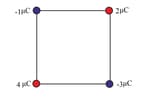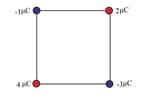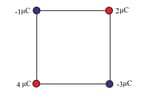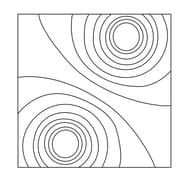Four charges are placed at the vertices of a square of side , as shown in the diagram.

On a copy of the diagram, show the forces acting on charge. Find the magnitude and the direction of the net force on the charge. (use .)


Important Questions on Fields (HL)
Four charges are placed at the vertices of a square of side , as shown in the diagram.

Calculate the value of the electric potential at the centre of the square (use .)
Four charges are placed at the vertices of a square of side , as shown in the diagram.

Determine the work that must be done in order to move a charge of initially at infinite to the centre of the square. (use .)
Two conducting spheres are separated by a distance that is large compared with their radii. The first sphere has a radius of and has a charge of on its surface. The second sphere has a radius of and is neutral. The spheres are then connected by a long conducting wire.
Find the charges on each sphere.
Two conducting spheres are separated by a distance that is large compared with their radii. The first sphere has a radius of and has a charge of on its surface. The second sphere has a radius of and is neutral. The spheres are then connected by a long conducting wire.
Calculate the charge density on each sphere (charge density is the total charge on the sphere divided by the surface area of the sphere).
Two conducting spheres are separated by a distance that is large compared with their radii. The first sphere has a radius of and has a charge of on its surface. The second sphere has a radius of and is neutral. The spheres are then connected by a long conducting wire.
Calculate the electric field on the surface of each sphere. (use .)
Two conducting spheres are separated by a distance that is large compared with their radii. The first sphere has a radius of and has a charge of on its surface. The second sphere has a radius of and is neutral. The spheres are then connected by a long conducting wire.
Comment on your result in the light of your answer to part that is calculation of charge density. Why it is stated that wire is long
The diagram shows the equipotential lines for two equal and opposite charges. Draw the electric field lines for these two charges.

The two long plates are separated by a distance of . The bottom plate is kept at a potential of and the top at . A charge is placed at a point from the bottom plate.
Find the electric potential energy of the charge.
